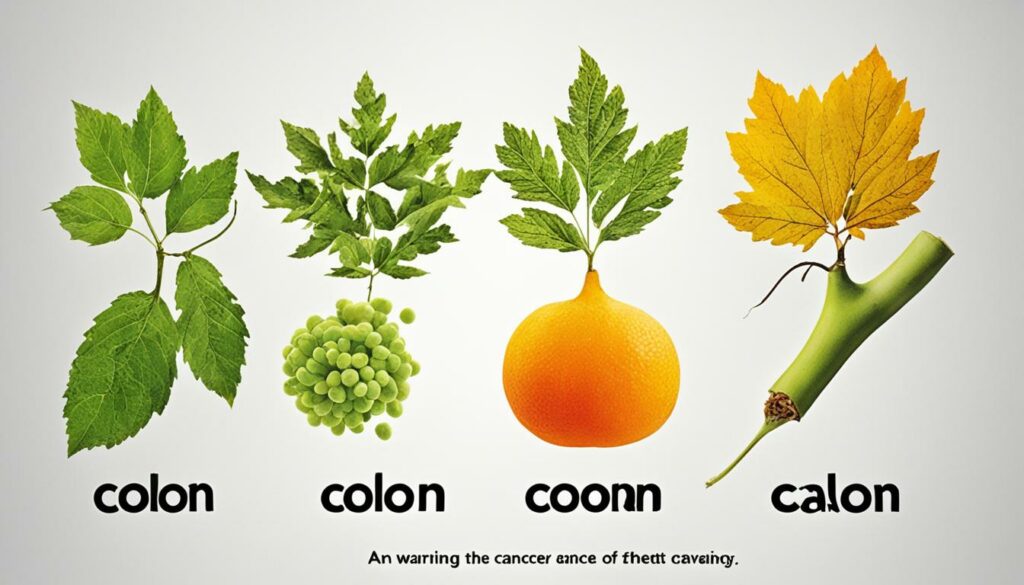Can Teens Get Colon Cancer? Risks & Prevention
Colorectal cancer is typically considered a disease that affects older adults, but it is possible for teens and young adults to develop colon cancer. While the majority of cases occur in people over the age of 50, there has been a rise in the prevalence of colon cancer among younger age groups. It is important to understand the risks and take steps for prevention to safeguard the health of teens and adolescents.
Key Takeaways:
- Colorectal cancer can occur in teens and young adults, although it is more common in older adults.
- Risk factors for colon cancer in teenagers include age, race, family history, and lifestyle choices.
- Early screening and adopting a healthy lifestyle can help prevent colon cancer in adolescents.
- Regular screenings, such as colonoscopies, may be necessary for individuals with a family history of colorectal cancer.
- Increasing awareness and investing in research can contribute to better prevention strategies and treatments for young adults.
Factors that Increase the Risk of Colorectal Cancer

Colorectal cancer can affect teens and young adults, and there are several factors that can increase the risk of developing the disease. Awareness of these risk factors is essential for early detection and prevention.
Age
While colorectal cancer tends to be more common in older adults, it is possible for teenagers and young people to develop the disease. It is important for young individuals to be aware of the symptoms of colon cancer and discuss any concerns with a healthcare professional.
Race and Sex
Some studies have suggested that race and sex may impact the risk of developing colorectal cancer. Black people have higher rates of sporadic colorectal cancer, and Black women are more likely to die from the disease compared to women from other racial groups. Men also have a slightly higher risk than women. All individuals, regardless of race or sex, should be aware of the risk and take necessary precautions.
Family History
A family history of colorectal cancer can significantly increase the risk for teens and young adults. If close relatives or several family members have had colorectal cancer, especially at a young age, the risk is nearly doubled. Regular screenings are particularly important for individuals with a family history of colorectal cancer.
Rare Inherited Conditions
There are certain rare inherited conditions, such as inflammatory bowel disease and adenomatous polyps, that can increase the risk of colorectal cancer in young individuals. It is crucial for those with these conditions to undergo regular screenings to detect any early signs of the disease.
Lifestyle Factors
Several lifestyle factors can also contribute to the risk of developing colorectal cancer. These include physical inactivity, obesity, smoking, and diabetes. Making healthy lifestyle choices, such as regular exercise, maintaining a healthy weight, and avoiding tobacco use, can help reduce the risk.
Educational Quote:
“Understanding the risk factors for colorectal cancer empowers young individuals to take control of their health and make informed choices for prevention.”
| Factors | Risk Level |
|---|---|
| Age | Varying risk for different age groups |
| Race and Sex | Increased risk for certain racial and gender groups |
| Family History | Significantly increased risk |
| Rare Inherited Conditions | Increased risk |
| Lifestyle Factors | Modifiable risk |
Age as a Risk Factor for Colorectal Cancer

Although colorectal cancer is more commonly diagnosed in older adults, it is important to recognize that teenagers and young adults can also develop the disease. While the average age of diagnosis for colon cancer is 66 for men and 69 for women, and 62 for men and 63 for women for rectal cancer, recent years have seen an increase in the incidence of colorectal cancer among younger adults. This highlights the need for teens to be aware of the signs and symptoms of colon cancer and take proactive steps towards prevention.
Prevention begins with maintaining a healthy lifestyle, including a balanced diet and regular exercise. By adopting these habits, teens can help reduce their risk of developing colon cancer. It is also important for young individuals to discuss any family history of the disease with a healthcare professional, as this can further inform prevention strategies.
By promoting awareness of colorectal cancer in teenagers and encouraging preventive measures, we can work towards reducing the impact of this disease. It is crucial for teens to understand that age is not an absolute barrier to developing colon cancer and to prioritize their health accordingly.
Race and Sex as Risk Factors for Colorectal Cancer
When it comes to colorectal cancer, race and sex play a significant role in determining risk. In the United States, Black people have the highest rates of sporadic colorectal cancer, making it crucial to raise awareness among teens about this deadly disease. Colorectal cancer is also a leading cause of cancer-related death among Black people, particularly affecting Black women more than any other racial group. Additionally, men have a slightly higher risk of developing colorectal cancer compared to women.
However, it is vital to note that colon cancer awareness in teens should extend beyond race and sex. Regardless of these factors, all adolescents should be educated about the risks and take proactive steps to ensure early detection and prevention. By spreading awareness, we can empower teens to make informed choices about their health and reduce their risk of developing colorectal cancer.
It is important to highlight the statistics supporting these risk factors. Below is a table that reflects the rates of colorectal cancer among different races and sexes:
| Race | Colorectal Cancer Rate |
|---|---|
| Black | Highest rates observed |
| White | Intermediate rates observed |
| Asian/Pacific Islander | Intermediate rates observed |
| Hispanic | Lowest rates observed |
By understanding the influence of race and sex on colorectal cancer, teens can become proactive in taking care of their health. Regular screenings, maintaining a healthy lifestyle, and discussing any concerns with healthcare professionals are all essential steps in preventing this disease. Colon cancer awareness in teens is the first line of defense in promoting early detection and ensuring a healthy future.
Family History and Inherited Conditions as Risk Factors for Colorectal Cancer

A family history of colorectal cancer can significantly increase the risk of developing the disease. If first-degree relatives or many other family members have had colorectal cancer, especially before the age of 60, the risk is nearly doubled.
Additionally, certain rare inherited conditions, such as inflammatory bowel disease and adenomatous polyps, can also increase the risk of colorectal cancer.
Teens with a family history of colorectal cancer should undergo regular screenings to detect any early signs of the disease.
Family History and Colorectal Cancer Risk
If you have a family history of colorectal cancer, it’s important to be aware of the increased risk. Individuals with first-degree relatives, such as parents, siblings, or children, who have had colorectal cancer are at a higher risk themselves. The risk is further elevated if multiple family members have had colorectal cancer, especially if they were diagnosed before the age of 60.
“A family history of colorectal cancer can significantly increase the risk of developing the disease.”
Genetic mutations that increase the likelihood of colorectal cancer can be passed down through families. These genetic factors can make individuals more susceptible to the disease, even at a young age. Therefore, it’s crucial for teens with a family history of colorectal cancer to discuss their risk with a healthcare professional and consider undergoing regular screenings.
Inherited Conditions and Colorectal Cancer
In addition to family history, certain inherited conditions can also raise the risk of developing colorectal cancer. Two notable examples are inflammatory bowel disease (IBD) and adenomatous polyps.
IBD, which includes Crohn’s disease and ulcerative colitis, causes chronic inflammation in the digestive tract. Individuals with IBD have an increased risk of developing colorectal cancer compared to the general population. Regular screenings and close monitoring are crucial for detecting any early signs of colorectal cancer in individuals with IBD.
Adenomatous polyps are noncancerous growths that can develop in the colon or rectum. While most polyps do not turn into cancer, certain types, called adenomas, can potentially become cancerous. Individuals with adenomatous polyps, especially those with multiple polyps or large polyps, have an increased risk of developing colorectal cancer. Regular screenings are essential for detecting and removing these polyps, thereby reducing the risk of cancer.
Regular screenings are particularly important for teens with a family history of colorectal cancer or those diagnosed with inherited conditions that increase the risk of the disease. Early detection through screenings can significantly improve outcomes and potentially save lives.
Prevention and Lifestyle Factors for Colorectal Cancer

While there is no surefire way to completely prevent colon cancer, teenagers can take steps to lower their risk through healthy lifestyle choices. By adopting these habits early on, teens can promote their long-term well-being and reduce the likelihood of developing colorectal cancer later in life.
Maintain a Healthy Body Weight
Regular exercise and a balanced diet can help teens maintain a healthy body weight, which plays a crucial role in colorectal cancer prevention. Obesity has been linked to an increased risk of developing colon cancer. Encourage teens to engage in physical activities they enjoy, such as sports, bike rides, or walks, for at least 60 minutes each day. Additionally, emphasize the importance of eating a well-rounded diet that includes lean proteins, whole grains, fruits, and vegetables.
Avoid Excessive Consumption of Red and Processed Meats
Red and processed meats have been associated with an increased risk of colorectal cancer. Encourage teens to limit their intake of these foods and opt for lean protein sources such as poultry, fish, beans, and lentils. It’s important to educate them about the potential risks and provide alternative options rich in essential nutrients.
Increase Intake of Fruits and Vegetables
Fruits and vegetables are packed with vitamins, minerals, and antioxidants that can help protect against colorectal cancer. Encourage teens to incorporate a variety of fruits and vegetables into their daily diet. This can include fresh options like berries, leafy greens, and citrus fruits, as well as frozen or canned produce when fresh options are not readily available or affordable.
Be Physically Active
Regular physical activity not only helps maintain a healthy weight but also reduces the risk of developing colorectal cancer. Encourage teens to participate in activities they enjoy, whether it’s team sports, dancing, swimming, or hiking. Aim for at least 60 minutes of moderate to vigorous physical activity each day.
Make Informed Choices
Teens should be informed about the potential risks associated with lifestyle choices such as smoking and excessive alcohol consumption. Engage in open and honest conversations about the harmful effects of these behaviors and empower them to make decisions that prioritize their long-term health.
Screening and Early Detection of Colorectal Cancer
Screening plays a crucial role in the early detection and prevention of colorectal cancer. While routine screenings are typically recommended for adults over the age of 50, individuals with a family history of colorectal cancer or other risk factors may need to start screenings at an earlier age.
The most common screening method is a colonoscopy, which allows for the direct inspection of the colon and the removal of precancerous polyps. Other screening tests, such as those that detect cancer DNA or blood in the stool, may also be recommended in certain cases.
| Screening Methods | Description |
|---|---|
| Colonoscopy | A procedure in which a flexible, tube-like instrument is inserted through the rectum to examine the colon and remove any abnormal growths or polyps. |
| Fecal immunochemical test (FIT) | A stool test that detects blood in the stool, which may indicate the presence of colorectal cancer or precancerous polyps. |
| Stool DNA test | A non-invasive test that detects specific DNA markers in the stool, helping to identify any genetic changes associated with colorectal cancer. |
The goal of screening is to detect colorectal cancer in its early stages when treatment is most effective. Regular screenings can help identify precancerous changes or early signs of cancer before symptoms appear.
Early detection through screening allows for timely intervention and can significantly improve the prognosis for individuals with colorectal cancer. It is important for adolescents and young adults to discuss their risk factors with a healthcare professional and determine the most appropriate screening method and timing based on their individual circumstances.
Colonoscopy Procedure and Preparation
A colonoscopy is a routine procedure used for the detection and prevention of colon cancer. It is an essential screening tool for teens and young adults to ensure early detection and prevention. Prior to the procedure, patients are required to follow a specific liquid diet and undergo bowel preparation to ensure a clear visualization of the colon.
During the colonoscopy, a thin, tube-like instrument with a light and a lens is inserted into the rectum. This instrument, called a colonoscope, allows the doctor to visualize the inside of the colon and examine the lining of the colon for any abnormalities or growths, such as polyps.
Colonoscopies are typically performed under sedation to minimize any discomfort. The doctor carefully navigates the colonoscope through the colon, taking images and videos to document any findings. If any polyps or abnormal growths are detected, the doctor can remove them during the procedure.
The risks associated with a colonoscopy are minimal, and complications are rare. Some potential risks include bleeding, infection, or perforation of the colon, but these are extremely rare occurrences. The potential benefits of early detection and prevention of colorectal cancer far outweigh the risks and make colonoscopies a valuable tool for maintaining colon health.
Quote: “A colonoscopy is a crucial procedure for teens and young adults in the prevention and early detection of colon cancer. By detecting and removing polyps during the colonoscopy, we can significantly reduce the risk of developing colorectal cancer.” – Dr. Sarah Johnson, Gastroenterologist
A colonoscopy is an important step in the prevention of colon cancer for teens and young adults. It allows for the identification and removal of precancerous growths, such as polyps, before they develop into cancer. Regular screenings can help safeguard the health of young individuals and ensure early intervention if necessary.
| Advantages of Colonoscopy | Disadvantages of Colonoscopy |
|---|---|
|
|
It is important for healthcare professionals to communicate with teens and young adults about the benefits and process of a colonoscopy. By addressing any concerns or fears, individuals can make informed decisions about their health and take the necessary steps for colon cancer prevention.
Importance of Early Screening and Diagnosis
Early screening and diagnosis play a critical role in improving the prognosis and treatment outcomes for individuals with colorectal cancer. While colon cancer is still considered rare in young adults, it is essential to recognize the increasing rates of the disease among this age group. Early detection can lead to more effective treatment options and a higher chance of successful recovery.
can young adults get colon cancer
If young adults experience any symptoms or have a family history of colorectal cancer, it is crucial for them to advocate for early screening. It is recommended to promptly discuss concerns with a healthcare professional who can assess the individual’s risk factors and determine the most appropriate screening and diagnostic methods.
Early screening allows for the identification of any potential abnormalities or precancerous growths in the colon or rectum before they progress into advanced stages. This early detection provides the opportunity for early intervention, which can significantly improve long-term outcomes and increase the chances of a full recovery.
“Early detection is key in successfully treating colorectal cancer. Don’t hesitate to voice your concerns and seek medical advice if you have any symptoms or risk factors.”
Some common symptoms of colorectal cancer include:
- Unexplained weight loss
- Changes in bowel habits, such as persistent diarrhea or constipation
- Blood in stool
- Abdominal pain or discomfort
If young adults experience any of these symptoms, it is important to seek medical evaluation to rule out the possibility of colorectal cancer.
Furthermore, individuals with a family history of colorectal cancer should be particularly vigilant and proactive in discussing their concerns with a healthcare professional. Regular screenings may be recommended at an earlier age for those with a significant family history of the disease or other risk factors.
Early screening and diagnosis not only offer the best chances for successful treatment but also provide the peace of mind that comes from taking control of one’s health. By staying proactive and aware, young adults can take important steps towards safeguarding their well-being and reducing the impact of colorectal cancer.
Takeaway
Early screening and diagnosis are pivotal in detecting colorectal cancer in young adults and improving treatment outcomes. By promptly addressing symptoms, discussing concerns with healthcare professionals, and advocating for early screenings, young adults can actively protect their health and navigate towards a positive prognosis.
Research and Awareness for Early-Onset Colorectal Cancer
The rise in early-onset colorectal cancer has sparked increased research efforts and awareness campaigns aimed at understanding the causes and risk factors of the disease among young adults. Scientists are actively investigating various factors such as diet, gut bacteria, inflammation, and environmental influences that may contribute to the development of early-onset colorectal cancer.
By deepening our knowledge and promoting awareness, we can pave the way for better prevention strategies and more effective treatments. Increased research funding and support will enable scientists and medical professionals to develop targeted interventions that address the rising rates of colorectal cancer in teens and young adults.
| Benefits of Research and Awareness for Early-Onset Colorectal Cancer |
|---|
| 1. Improved understanding of risk factors |
| 2. Enhanced prevention strategies |
| 3. Early detection methods |
| 4. Targeted treatment options |
| 5. Increased survival rates |
By investing in research and raising awareness, we can make significant strides in combating early-onset colorectal cancer and safeguarding the health of teens and young adults. It is vital that individuals, communities, and policymakers come together to prioritize colon cancer awareness in teens and support ongoing research efforts.
Conclusion
While colorectal cancer is more commonly diagnosed in older adults, it is important to recognize that teens and young adults can also develop this disease. Several factors, including age, race, family history, and lifestyle choices, can increase the risk of colon cancer in teenagers. Therefore, it is crucial for teens and adolescents to be aware of the signs and symptoms of colon cancer, undergo regular screenings if necessary, and adopt a healthy lifestyle to reduce their risk.
By promoting awareness about colon cancer in teenagers, conducting extensive research, and emphasizing early detection, we can make significant progress in preventing and combating colorectal cancer among young populations. It is essential to educate teenagers about the importance of maintaining a healthy lifestyle, including regular exercise, a balanced diet, and avoiding smoking and excessive red or processed meat consumption.
Furthermore, healthcare professionals should encourage open discussions about family history and potential risk factors, enabling them to identify individuals who may benefit from early screenings. By taking these proactive steps, we can empower teens and young adults to prioritize their health and potentially detect colorectal cancer at an early stage, improving treatment outcomes and quality of life.
FAQ
Can teens get colon cancer?
Yes, it is possible for teens and young adults to develop colon cancer, although it is more commonly diagnosed in older adults.
What are the risk factors for colorectal cancer in teens and young adults?
Factors that can increase the risk of developing colon cancer in teens and young adults include age, race, family history, certain inherited conditions, inflammatory bowel disease, adenomatous polyps, personal history of certain types of cancer, physical inactivity and obesity, smoking, and diabetes.
What are the signs and symptoms of colon cancer in teens?
Common signs and symptoms of colon cancer in teens include changes in bowel habits, blood in the stool, abdominal pain or cramping, unexplained weight loss, fatigue, and anemia.
How can teens prevent colon cancer?
While there is no proven way to completely prevent colorectal cancer, teens can reduce their risk by maintaining a healthy lifestyle, including regular exercise, a balanced diet, avoiding excessive consumption of red and processed meats, and increasing the intake of fruits and vegetables.
Should teens undergo regular screening for colon cancer?
Routine screenings for colon cancer are typically recommended for adults over the age of 50. However, individuals with a family history of colorectal cancer or other risk factors may need to start screenings at an earlier age.
What is a colonoscopy and how is it performed?
A colonoscopy is a procedure used for the detection and prevention of colon cancer. It involves the insertion of a thin, tube-like instrument with a light and a lens into the rectum, allowing the doctor to visualize the inside of the colon and remove any abnormal growths or polyps.
Why is early screening and diagnosis important for young adults?
While colon cancer is still considered rare in young adults, the increasing rates of the disease among this age group highlight the importance of early detection. Early screening and diagnosis can significantly improve the prognosis and treatment outcomes for individuals with colorectal cancer.
What research efforts and awareness campaigns are focused on early-onset colorectal cancer?
There are increased research efforts and awareness campaigns focused on understanding the causes and risk factors of early-onset colorectal cancer among young adults. Scientists are investigating the role of diet, gut bacteria, inflammation, and environmental factors in the development of the disease.
Can young adults get colon cancer?
Yes, young adults can develop colon cancer. While it is more commonly diagnosed in older adults, there has been a rise in the incidence of colorectal cancer among younger age groups.
Source Links
- https://www.cancer.net/cancer-types/colorectal-cancer/risk-factors-and-prevention
- https://health.ucdavis.edu/blog/cultivating-health/colon-cancer-is-on-the-rise-in-younger-adults-what-you-should-look-for/2023/03
- https://www.cancer.gov/news-events/cancer-currents-blog/2020/colorectal-cancer-rising-younger-adults







